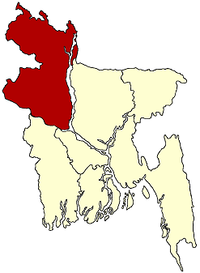Varendra


Varendra (Bengali: বরেন্দ্র), also known as Barind (Bengali: বারিন্দ), was an ancient and historical territory of Northern Bengal, now mostly in Bangladesh and a little portion in the Indian state of West Bengal and Eastern Bihar. [1][2]
It formed part of the Pundravardhana or Pundra Kingdom region currently part of Rangpur and Rajshahi Divisions of Bangladesh and included the districts of Bogra, Rajshahi, Pabna and Dinajpur of Bangladesh and West Dinajpur and Malda of India. According to Cunningham, the boundary of Varendra was the Ganges and the Kosi river on the west, the Karatoya on the east, the Padma River on the south and the land between Cooch Behar and included the Terai[2]
Literature and inscriptions
[edit]According to R. C. Majumdar, the term Varendra-mandala occurs in the Ramacharitam, which places it between the Ganges and Karatoya rivers. He writes, "Its inclusion with Pundravardhana is proved by the Silimpur, Tarpandighi and Madhainagar inscriptions. The Tabaquat-i-nasiri mentions Barind as the wing of the territory of Lakhnawati on the eastern side of Ganges".[1]
History
[edit]Historical evidence attests significant presence of Brahmins in Bengal during the Maurya period. The Jain Acharya Bhadrabahu, regarded to be the preceptor of Chandragupta Maurya, is said to have been born in Brahmin family of Pundravardhana (or Puṇḍra, the region north of the Ganges and west of Brahmaputra in Bengal, later known as Vārendra).[2] Such evidences suggest Puṇḍra or Vārendra and regions west of Bhagirathi (called Radha in ancient age) to be seats of Brahmins from ancient times.
According to HC Raychoudhuri, the Gupta dynasty originated from the Varendra region.[3] According to the Khalimpur copper plate inscription, the first Pala Emperor Gopala was the son of a warrior named Vapyata. The Ramacharitam attests that Varendra (North Bengal) was the fatherland (Janakabhu) of the Palas.
Modern usage
[edit]- Varendra Research Society
- Varendra Research Museum
- Varendra rebellion
- Varendra University
- Varendra tract
See also
[edit]References
[edit]- ^ a b Majumdar, R. C. (1971). History of Ancient Bengal. Calcutta: G. Bhardwaj & Co. p. 13. OCLC 961157849.
- ^ a b c AM Chowdhury (2012). "Varendra". In Sirajul Islam; Miah, Sajahan; Khanam, Mahfuza; Ahmed, Sabbir (eds.). Banglapedia: the National Encyclopedia of Bangladesh (Online ed.). Dhaka, Bangladesh: Banglapedia Trust, Asiatic Society of Bangladesh. ISBN 984-32-0576-6. OCLC 52727562. OL 30677644M. Retrieved 22 November 2024.
- ^ "Gupta Rule". Banglapedia. Retrieved 21 June 2024.
